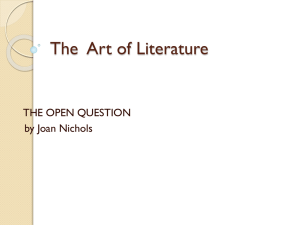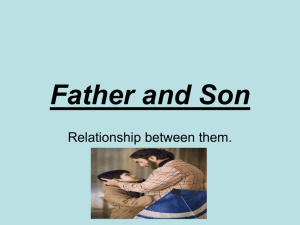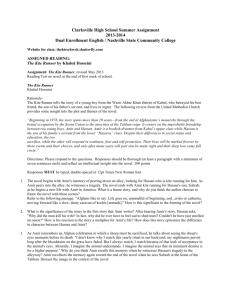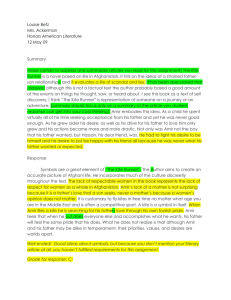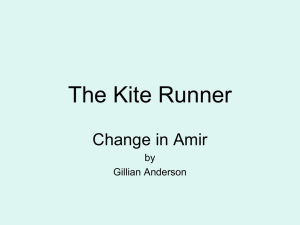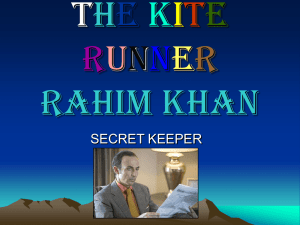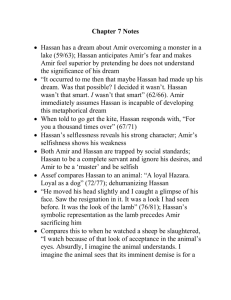AP Literature Summer Assignment: Kite Runner & Poetry
advertisement
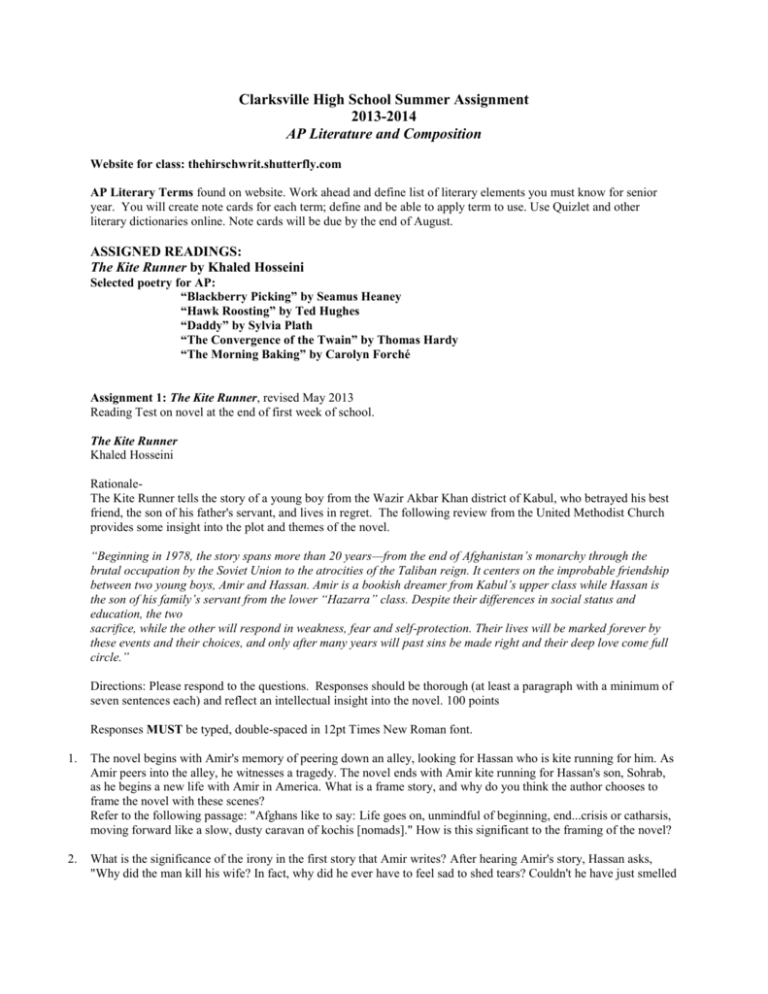
Clarksville High School Summer Assignment 2013-2014 AP Literature and Composition Website for class: thehirschwrit.shutterfly.com AP Literary Terms found on website. Work ahead and define list of literary elements you must know for senior year. You will create note cards for each term; define and be able to apply term to use. Use Quizlet and other literary dictionaries online. Note cards will be due by the end of August. ASSIGNED READINGS: The Kite Runner by Khaled Hosseini Selected poetry for AP: “Blackberry Picking” by Seamus Heaney “Hawk Roosting” by Ted Hughes “Daddy” by Sylvia Plath “The Convergence of the Twain” by Thomas Hardy “The Morning Baking” by Carolyn Forché Assignment 1: The Kite Runner, revised May 2013 Reading Test on novel at the end of first week of school. The Kite Runner Khaled Hosseini RationaleThe Kite Runner tells the story of a young boy from the Wazir Akbar Khan district of Kabul, who betrayed his best friend, the son of his father's servant, and lives in regret. The following review from the United Methodist Church provides some insight into the plot and themes of the novel. “Beginning in 1978, the story spans more than 20 years—from the end of Afghanistan’s monarchy through the brutal occupation by the Soviet Union to the atrocities of the Taliban reign. It centers on the improbable friendship between two young boys, Amir and Hassan. Amir is a bookish dreamer from Kabul’s upper class while Hassan is the son of his family’s servant from the lower “Hazarra” class. Despite their differences in social status and education, the two sacrifice, while the other will respond in weakness, fear and self-protection. Their lives will be marked forever by these events and their choices, and only after many years will past sins be made right and their deep love come full circle.” Directions: Please respond to the questions. Responses should be thorough (at least a paragraph with a minimum of seven sentences each) and reflect an intellectual insight into the novel. 100 points Responses MUST be typed, double-spaced in 12pt Times New Roman font. 1. The novel begins with Amir's memory of peering down an alley, looking for Hassan who is kite running for him. As Amir peers into the alley, he witnesses a tragedy. The novel ends with Amir kite running for Hassan's son, Sohrab, as he begins a new life with Amir in America. What is a frame story, and why do you think the author chooses to frame the novel with these scenes? Refer to the following passage: "Afghans like to say: Life goes on, unmindful of beginning, end...crisis or catharsis, moving forward like a slow, dusty caravan of kochis [nomads]." How is this significant to the framing of the novel? 2. What is the significance of the irony in the first story that Amir writes? After hearing Amir's story, Hassan asks, "Why did the man kill his wife? In fact, why did he ever have to feel sad to shed tears? Couldn't he have just smelled an onion?" How is his reaction to the story a metaphor for Amir's life? How does this story epitomize the difference in character between Hassan and Amir? 3. As Amir remembers an Afghan celebration in which a sheep must be sacrificed, he talks about seeing the sheep's eyes moments before its death. "I don't know why I watch this yearly ritual in our backyard; my nightmares persist long after the bloodstains on the grass have faded. But I always watch, I watch because of that look of acceptance in the animal's eyes. Absurdly, I imagine the animal understands. I imagine the animal sees that its imminent demise is for a higher purpose." Why do you think Amir recalls this memory when he witnesses Hassan's tragedy in the alleyway? Amir recollects the memory again toward the end of the novel when he sees Sohrab in the home of the Taliban. Discuss the image in the context of the novel. 4. Early in Amir and Hassan's friendship, they often visit a pomegranate tree where they spend hours reading and playing. "One summer day, I used one of Ali's kitchen knives to carve our names on it: 'Amir and Hassan, the sultans of Kabul.' Those words made it formal: the tree was ours." In a letter to Amir later in the story, Hassan mentions that "the tree hasn't borne fruit in years." Discuss the significance of this tree and that “the tree hasn’t borne fruit in years.” 5. While in the hospital in Peshawar, Amir has a dream in which he sees his father wrestling a bear: "They role over a patch of grass, man and beast...they fall to the ground with a loud thud and Baba is sitting on the bear's chest, his fingers digging in its snout. He looks up at me, and I see. He's me. I am wrestling the bear." Why is this dream so important at this point in the story? What does this dream finally help Amir realize? In addition, explain the bear metaphor in literature. You may use internet sources in your search for an explanation. _____________________________________________________________________________________________ Assignment 2: Analyze each of the five poems separately using the TPCASTT template. Use a separate sheet of paper for each poem (total of 5). TPCASTT: Title, Paraphrase, Connotation, Attitude, Shift, Title, Theme Title of Poem Paraphrase: by line or stanza Connotation: implied meaning of words and use of literary elements Attitude: attitude of the speaker of the poem Shift: change or shift in meaning or emotion Title: significance of the title/meaning Theme: main idea or concept Explain at least 5 literary elements for each poem.
